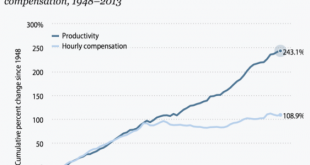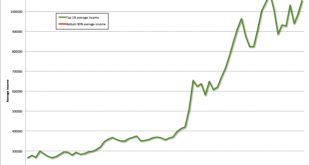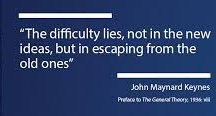from Asad Zaman PRELIMINARY REMARKS: Philosopher Hilary Putnam writes in “The Collapse of the Fact/Value Distinction” that there are cases where we can easily and clearly distinguish between facts and values — the objective and the subjective. However, it is wrong to think that we can ALWAYS do so. There are many sentences, especially in economic theories, where the two are “inextricably entangled” . This is the fourth post in a sequence about Re-Reading Keynes. This post is focused on a...
Read More »The disconnect in the US between productivity and wages
Since 1975 workers have received almost none of the gains of increased productivity, which has increased by 143% since around 1975 (figure 14). In other words, productivity has more than doubled, while workers received none of the gains. This can be explained by the deindustrialization of the US economy, as heavy industries followed by manufacturing in general were exported to Asia. Due to this trend there was a huge decrease in unionization which went from 39% in 1940 to around 10% in...
Read More »P3: Impact of Keynes
from Asad Zaman This 1000 word article is the third in a series of posts on Re-Reading Keynes. It traces the impact of Keynesian theories on the 20th century, as necessary background knowledge for a contextual and historically situated study of Keynes. It was published in Express Tribune on 4 Nov 2016. The Global Financial Crisis (GFC) has created awareness of the great gap between academic models and reality. IMF Chief Economist Olivier Blanchard said that modern DSGE macroeconomic...
Read More »Class before Trumponomics, part 1
from David Ruccio Right now, after Donald’s Trump surprising victory and in the midst of the messy transition, everyone is curious about how the U.S. economy will change if and when the president-elect’s economic policies are enacted.* But first things first. We need to have a clear understanding of what the U.S. economy looks like now, during the uneven recovery from the Second Great Depression. In particular, it’s important to analyze the class dimensions of that recovery, even before...
Read More »How Trump theft hurts you: thoughts to chew on over Thanksgiving dinner
from Dean Baker Donald Trump has basically come right out said that he intends to use the presidency to further enrich himself and his family. After refusing to follow long-established precedent and put his assets in a blind trust, he proclaimed, “the president can’t have a conflict of interest.” Of course the president absolutely can have a conflict of interest as speakers of the English language use the expression. If a president owns a large business empire, as does Mr. Trump, there...
Read More »Richard Rorty, postmodernism, and Trump
from David Ruccio Yes, the late Richard Rorty got it spot on: Members of labor unions, and unorganized unskilled workers, will sooner or later realize that their government is not even trying to prevent wages from sinking or to prevent jobs from being exported. Around the same time, they will realize that suburban white-collar workers—themselves desperately afraid of being downsized—are not going to let themselves be taxed to provide social benefits for anyone else. At that point,...
Read More »P2: Methodology for (Re)-Reading Keynes
from Asad Zaman The first post on Reading Keynes provided an outline of the reasons why this is a good idea. It is clear that economics is broken. We need a new macroeconomics for the 21st century, one which can solve the massive problems which humanity as a whole is facing on political, social, economic, and environmental dimensions. Keynes faced similar problems, and found solutions which guided economic policy in the mid twentieth century. It is always useful to absorb the insights of...
Read More »Sitglitz comes around
A new paper by Joseph Stiglitz (it might be that he has been holding these ‘heterodox’ (better: common sense) views for some time already): In the aftermath of the Great Recession, there is a growing consensus, even among central bank officials, concerning the limitations of monetary policy. This paper provides an explanation for the ineffectiveness of monetary policy, and in doing so provides a new framework for thinking about monetary policy and macro-economic activity. What matters is...
Read More »Terry Crouch & Dean Baker – I Don’t Wanna Talk About It – Acoustic Cover
Chilled acoustic rendition of the Rod Stewart classic
Read More »P1: Reading Keynes
from Asad Zaman I am planning a sequence of posts on re-reading Keynes, where I will try to go through the General Theory. This first post explains my motivations for re-reading Keynes. As always, my primary motive is self-education; this will force me to go through the book again — I first read it in my first year graduate course on Macroeconomics at Stanford in 1975, when our teacher Duncan Foley was having doubts about modern macro theories, and decided to go back to the original...
Read More » Real-World Economics Review
Real-World Economics Review




